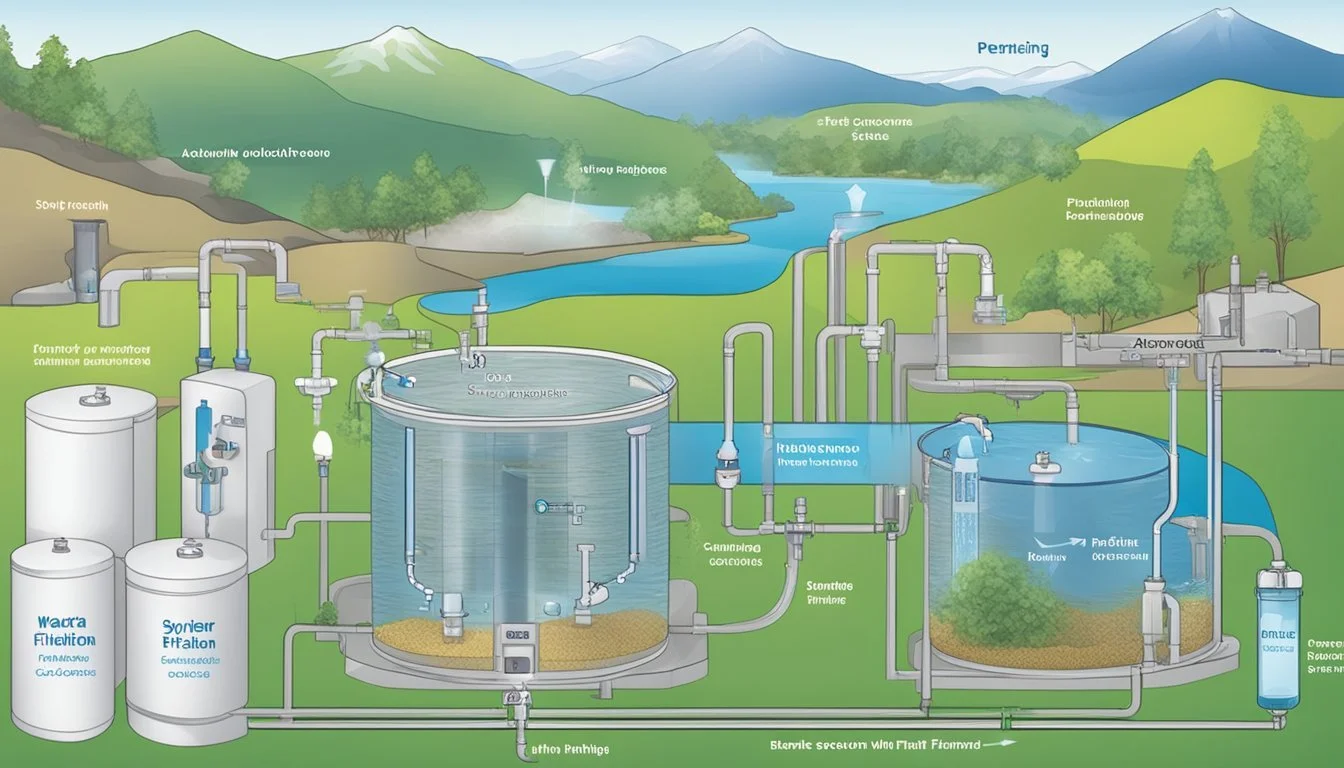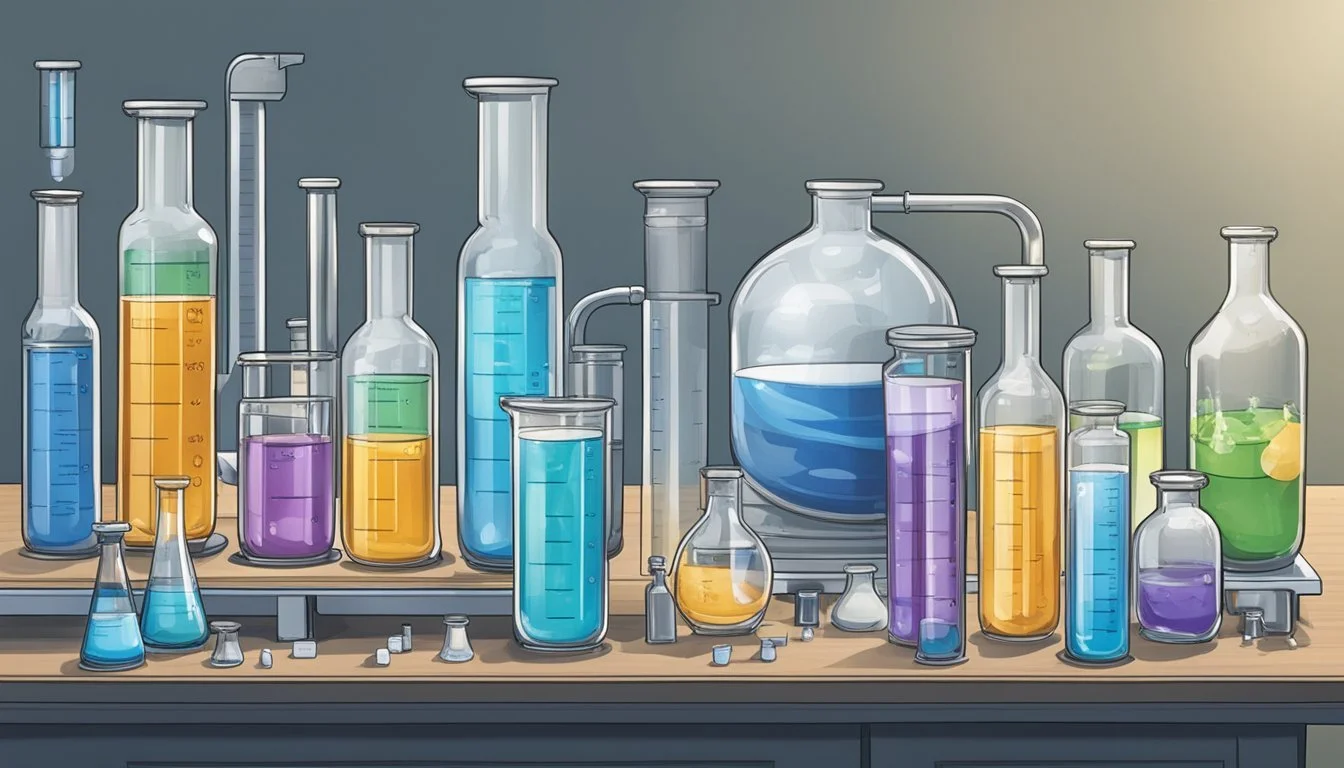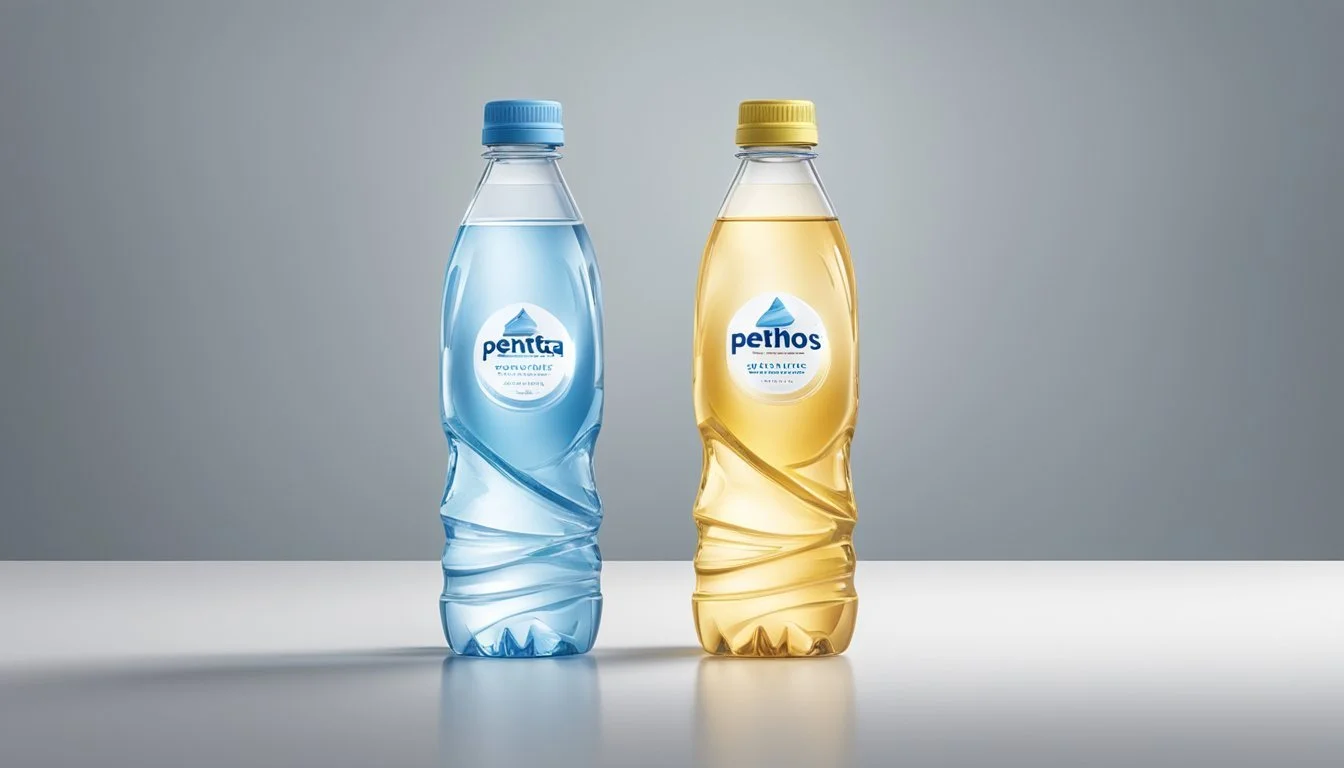Ethos vs. Penta
Comprehensive Comparison of Bottled Water Brands
When it comes to choosing bottled water, consumers are often faced with a plethora of options, each promising purity, taste, and quality. Ethos and Penta represent two brands that have generated interest among health-conscious individuals and hydration seekers alike. Ethos Water, often associated with its philanthropic endeavors, markets itself as a socially responsible choice, pledging to provide clean water to communities in need. Meanwhile, Penta Water asserts a scientific edge, boasting ultra-purified water that is free of impurities and contaminants through a patented 13-step purification process.
The debate between Ethos and Penta ultimately centers on the factors consumers value most. For some, the decision may rest on Ethos Water's commitment to making a positive global impact with each purchase. On the other hand, Penta Water appeals to those prioritizing the technical aspects of water purification and its potential health benefits. Both brands have their merits, and the preference may come down to individual priorities, be it taste, ethical considerations, or the pursuit of hydration through the purest means available.
Without choosing sides, this article examines both Ethos and Penta bottled water, providing a fair assessment of their qualities. The discussion includes an analysis of their sourcing, purification methods, taste profiles, and their respective environmental and ethical standings. This comparison aims to equip readers with the necessary information to make an informed decision suitable to their personal standards for bottled water.
Bottled Water Fundamentals
In the context of Ethos and Penta bottled water, understanding the essence of bottled water and its regulatory environment is essential.
What is Bottled Water?
Bottled water is a beverage product sold in sealed containers for personal consumption and hydration. It can originate from various sources, including springs, artesian wells, or it may be purified municipal water. The water is often treated through processes such as reverse osmosis, distillation, or filtration. The final product is then packaged in plastic or glass bottles of various sizes.
Bottled Water Regulation
The safety and quality of bottled water are monitored by the Food and Drug Administration (FDA). The FDA ensures that bottled water manufacturers adhere to specific standard of identity, quality, and good manufacturing practices. Bottled water must comply with the FDA's regulations for safety, which include:
Monitoring for contaminants such as volatile organic compounds, heavy metals, and microbiological organisms.
Compliance with specific FDA-established standards for purified water, if labeled as such.
Regular inspection of bottling facilities to ensure sanitary conditions are maintained.
Labeling requirements that stipulate the disclosure of the water source and any treatment it has undergone.
The Health Implications of Water Consumption
When consuming bottled water, health implications arise from various factors, including water's pH, its mineral and electrolyte content, and the overall hydration it provides. Each aspect plays a critical role in determining the potential impacts on health.
Understanding pH and Health
pH refers to the water's level of acidity or basicity, which is measured on a scale from 0 to 14, with 7 being neutral. Ethos and Penta bottled waters have distinct pH levels, typically falling in the range of slightly acidic to neutral for Ethos, while Penta boasts a neutral pH. A neutral pH is often seen as ideal, as it is thought to mirror the body's natural pH and is believed not to disrupt the body's acid-base balance. For children, maintaining a balanced pH is especially important as their bodies are still developing and they are more sensitive to pH imbalances.
Minerals and Electrolytes in Bottled Water
Bottled water brands, like Ethos and Penta, may vary in their minerals and electrolytes content. Commonly found minerals in bottled water include calcium, magnesium, and potassium, which are essential for bone health, muscle function, and regulating blood pressure. Electrolytes, such as sodium and potassium, are vital for hydration as they help balance fluids in the body. A comparison might reveal that one brand contains higher levels of certain minerals or electrolytes, impacting the purchaser's decision based on their dietary needs.
Hydration and Health
Proper hydration is crucial for maintaining good health. Water is the body's principal chemical component and is involved in many critical functions, including regulating temperature, transporting nutrients, and flushing toxins. Moreover, adequate water intake is necessary to prevent dehydration—a condition that can be particularly dangerous for children, who have higher water requirements in relation to their body weight. When selecting a bottled water like Ethos or Penta, consumers should consider the taste and how it affects their willingness to drink enough water to stay well-hydrated throughout the day.
Ethos and Penta: A Comparative Analysis
In evaluating Ethos and Penta bottled waters, the reader should consider factors such as brand reputation, taste, purity, and price to determine which water might best suit their preferences and needs.
Brand Overview
Ethos Water is a Starbucks-owned brand, recognized for its commitment to humanitarian efforts. For every bottle sold, a portion of the profit goes towards water, sanitation, and hygiene education programs in water-stressed countries. Penta Water, on the other hand, boasts its ultra-purified drinking water that undergoes a patented 13-step purification process for a clean and pure taste.
Taste Profile
The taste of Ethos Water is often described as clean and refreshing, a characteristic attributed to the natural spring sources from which it is drawn. Penta Water, with its rigorous purification technique, including UV light treatment and two steps of reverse osmosis, claims a smooth and slightly sweet taste profile due to the absence of most dissolved solids.
Purity and Contaminants
When comparing purity, Penta Water takes considerable pride in offering a product that it claims is free from contaminants, chemicals, pesticides, and heavy metals. Their purification process aims to remove more impurities than standard filtration methods. Ethos Water sources from private springs and is filtered naturally, but its exact purification methods and contaminant levels are less prominently advertised.
Cost Analysis
Ethos Water is generally sold at a premium price, in part due to its social enterprise model and availability in Starbucks stores. The regular price for a 23.7 fl oz bottle hovers around $1.95. In contrast, Penta Water emphasizes its advanced purification technology, which can influence a higher price point. A 33.8 fl oz bottle can cost approximately $3.00 or more, depending on the retailer.
Environmental Considerations
When comparing Ethos and Penta bottled water, one must take into account their environmental footprint. This includes the impacts of their plastic bottles and the sustainability of their water sources.
The Impact of Plastic Bottles
Ethos Water states that it uses bottles made from 50% recycled plastic, which mitigates some environmental impact by reusing materials. However, the production and disposal of plastic bottles remain a concern. Every plastic bottle produced contributes to the consumption of fossil fuels and greenhouse gas emissions during production and transport. Recycling rates for plastic are still low, resulting in significant amounts of waste ending up in landfills or the natural environment.
Penta Water also uses plastic bottles, but there is no clear indication that these are made from recycled content. Like all plastic bottles, these carry the same environmental repercussions unless Penta adopts more aggressive recycling initiatives or shifts towards more sustainable packaging solutions.
Source Sustainability
Ethos Water sources its water with a commitment to sustainability. Ethos partners with organizations dedicated to water conservation, indicating an awareness of the need to protect water resources. However, specifics on the direct sustainability practices at their water source are less clear.
On the other hand, Penta Water emphasizes its ultra-purification process, but it does not extensively publicize the sustainability of its water sources. Sustainable water sourcing is becoming increasingly important, and lack of transparency could raise questions regarding the long-term impact of their operations on local water supplies.
Water Sourcing and Filtration
In the context of bottled water, the journey from source to bottle involves a critical examination of water sourcing practices and the filtration methods employed. These aspects greatly influence the quality of the final product, Ethos and Penta, and are therefore key to understanding which bottled water may be considered 'better'.
Tap Water vs. Bottled Water
Tap water and bottled water differ primarily in their sources. While tap water typically originates from surface water or groundwater and is treated at municipal treatment facilities, both Ethos and Penta bottled waters assert that they begin with a different approach. Ethos utilizes filtered tap water, elevating it through additional purification measures. On the other hand, Penta sources its product from natural aquifers, placing emphasis on their unique ultra-filtration process.
Source Type Ethos Penta Source Filtered tap water Groundwater aquifers Treatment Various filtration processes Ultra-filtration
Filtration Techniques
The filtration process plays a pivotal role in determining the safety and taste profile of water. Ethos capitalized on a multi-step filtration system that includes techniques such as reverse osmosis and ozonation to ensure purity. Penta, distinctively, employs a patented 13-step, 11-hour purification process that removes more impurities than standard methods.
Ethos: Reverse osmosis, ozonation
Penta: 13-step patented process
Natural Sources and Filtration
While Ethos relies on municipally sourced water and refines it, Penta boasts the use of water tapped from natural aquifers—an underground layer of water-bearing materials. Both brands claim to go beyond the standard filtration practices to achieve a higher purity level. Yet, differences in their sources, which may range from mountain spring water to deeper groundwater reserves, are said to impart distinctive characteristics to each brand's bottled water product.
Ethos Penta Begins with municipally sourced water Sourced from a protected aquifer Enhanced via advanced filtration techniques Natural filtration plus advanced purification
Taste Factors in Bottled Water
When assessing bottled water brands, taste is a subjective factor but crucial to the consumer's preference. It hinges on mineral content, water source, and the purification process which can all contribute to the overall flavor profile.
Comparing Water Brands
Ethos and Penta are distinct in their water sources and treatment processes. Ethos is known for contributing to humanitarian water programs, drawing water that is purified and enhanced with minerals. On the other hand, Penta boasts a 13-step purification process with its water undergoing ultraviolet light treatment and infused with oxygen for a distinct taste.
Ethos Water: Mineral-enhanced for a distinct flavor.
Penta Water: Highly purified with a clean taste.
Taste Test Methodologies
To fairly compare the taste of different bottled water brands, structured taste tests are conducted. These tests often include:
Blind Taste Testing: Testers sample water without brand labels to avoid bias.
Controlled Variables: Temperature and serving conditions are kept consistent.
Panel Formation: A mix of experts and consumers often make up the tasting panel, providing a well-rounded evaluation.
For Ethos and Penta, a taste test could involve assessing the crispness, freshness, and any aftertaste, providing a comprehensive guide to how each brand's water flavor is perceived by a range of individuals.
Chemical and Physical Analysis
When comparing Ethos and Penta bottled water, it's crucial to precisely analyze their mineral content and pH levels to understand their quality and health benefits.
Assessing Mineral Content
Ethos water is known for its enhanced mineral content, specifically designed to include beneficial minerals like calcium, potassium, and magnesium. These minerals are essential for maintaining a healthy body function and are added during the bottling process. On the other hand, Penta water prides itself on a unique purification process, which results in an ultra-pure water. However, this process also removes naturally occurring minerals to a large extent, which may be a downside for those looking for mineral supplementation from their bottled water.
Mineral Comparison Table:
Mineral Ethos (mg/L) Penta (mg/L) Calcium High Low Potassium Moderate Trace Magnesium Moderate Trace
Examining pH Levels
The pH level of water can affect its taste and how it interacts with the body. Ethos water tends to lean towards slightly alkaline water with a pH level usually above 7, attributable to the added minerals. Alkaline water can buffer acidity in the body and potentially offer hydration benefits. Penta water, in contrast, does not explicitly focus on alkalinity but instead goes through a patented 13-step purification process. This results in water that is neutral or slightly alkaline but not specifically engineered for high pH levels.
pH Level Comparison Table:
Brand pH Level Ethos Slightly above 7 Penta Neutral to slightly alkaline
Consumer Preferences and Convenience
In the realm of bottled water, consumer choices often hinge on brand reputation and accessibility. Brand loyalty and the convenience of obtaining a product play pivotal roles in determining consumer preferences.
Brand Loyalty in Water Choices
Customers frequently gravitate towards brands they trust. With Ethos and Penta, two premium bottled water brands, brand loyalty can significantly influence purchasing decisions. Ethos, known for its philanthropic angle—providing a portion of proceeds to water-related causes—has a cadre of consumers loyal to its mission and product. Penta, meanwhile, boasts of a rigorous 13-step purification process, appealing to those prioritizing water purity.
Ethos: Aligns with socially conscious consumers
Penta: Targets those seeking high-quality purification
The Convenience Factor
The availability of bottled water at various retail outlets, including Safeway supermarkets and Starbucks coffee shops, boosts its convenience quotient. Safeway, with its widespread presence, offers an array of bottled water choices, making it a go-to for shoppers looking for both Ethos and Penta. Starbucks' decision to stock Ethos water adds a layer of convenience for customers who can grab a bottle to go with their coffee, thereby imbibing loyalty through association with the familiar coffee brand.
Safeway: Provides easy access to multiple bottled water options
Starbucks: Enhances Ethos' reach by coupling it with coffee offerings
Brand recognition and easy availability are central to consumer preference in the bottled water market, shaping the decisions they make at the point of purchase.
Safety and Quality Assurance
When choosing between Ethos and Penta bottled water, consumers often prioritize safety and quality assurance. This section examines the sterilization and purification processes and the adherence to regulatory standards that both brands implement to ensure their water is free from contaminants.
Sterilization and Purifying Processes
Ethos Water employs a multi-barrier approach to sterilization and purification, designed to remove or reduce microorganisms, viruses, and other potential toxins. First, Ethos typically implements filtration and reverse osmosis processes, followed by ultraviolet (UV) light treatment, which is effective for destroying harmful pathogens without adding chemicals.
Penta Water, on the other hand, touts a patented 13-step purification process that includes microfiltration, UV treatment, and deionization. They boast that their purification process removes more impurities than standard filtration, effectively reducing the presence of toxins, chemicals, and lead. Moreover, Penta Water claims their process helps to prevent the leaching of BPA from their bottles, addressing consumer concerns about the chemical's link to cancer and other health issues.
Regulatory Standards
Both Ethos and Penta adhere to the stringent standards imposed by the U.S. Food and Drug Administration (FDA) and the Environmental Protection Agency (EPA). These regulatory agencies set the legal limits for contaminants in bottled water, placing the safety of the consumer first.
Ethos Water is subject to the FDA's Good Manufacturing Practices (GMP), ensuring that the water is bottled under safe and sanitary conditions.
Penta Water undergoes rigorous testing for the presence of contaminants, aligning with both FDA standards for bottled water and the EPA's standards for tap water, often considered a more stringent reference point.
It's integral to note that both brands aim to maintain compliance with relevant standards and openly communicate their safety and quality measures to the public, fostering trust in their commitment to providing pure and safe bottled water.
The Future of Bottled Water
The bottled water industry is poised for transformative changes, with a focus on sustainable packaging and advanced filtration techniques that promise to redefine consumers' drinking experiences.
Innovations in Packaging
Manufacturers are exploring environmentally friendly packaging solutions to reduce the carbon footprint of bottled water. Boxed water brands, such as Boxed Water Is Better, are leading the way with their 92% plant-based cartons, a notable shift from traditional plastic bottles. LIFEWTR has also committed to offering 100% recycled plastic bottles, mirroring the industry's move towards sustainability.
Mitte represents an innovative approach to clean water consumption, combining purification with home dispensing to minimize reliance on single-use bottles. They leverage a home water system that filters and enhances water with minerals, catering to consumer desires for both purity and convenience.
Advancements in Filtration Technology
The evolution of filtration technology is at the forefront of delivering cleaner and safer bottled water. The Brita pitcher, a household name in water filtration, continues to evolve with improved filters that can reduce contaminants more effectively than before. This advancement promotes access to clean water directly from the tap, changing the dynamics of bottled water consumption.
Companies invest in advanced filtration systems to ensure their bottled water meets high purity standards. These technologies often include a combination of micro-filtration, reverse osmosis, and UV light treatment to deliver water that is not only safe to drink but also retains beneficial minerals.
Conclusion
When comparing Ethos and Penta bottled waters, consumers must consider several factors such as source, purification process, taste, and price. Each brand offers its own advantages:
Ethos Water:
Ethically committed to humanitarian causes, with a portion of its profits going to water-related charity work.
Sourced from public water sources with added minerals for improved taste.
Penta Water:
Undergoes a 13-step purification process, aiming for high purity and quality.
Claims to provide ultra-pure water by removing more impurities than standard filtration methods.
Taste and Hydration: Both brands aim to offer a clean taste and sufficient hydration. Preferences may vary, with some consumers favoring Ethos for its added minerals and others preferring Penta’s purity-focused approach.
Cost: Ethos Water tends to be moderately priced, fairly accessible, and can be found in many Starbucks locations, given their partnership. Penta Water, often considered a premium product, is usually priced higher due to its extensive purification process.
Consumers should weigh these factors based on personal priorities. Those valuing ethical practices might lean towards Ethos, while those prioritizing water purity might prefer Penta. Neither brand is unequivocally superior; the choice depends on individual values and taste preferences.






